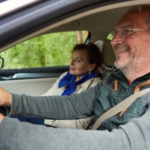My mother’s friend Carol was doing lunges in the parking lot of a Trader Joe’s when I realized everything I’d been taught about aging was wrong. She’d just finished her grocery shopping—kale, dark chocolate, those expensive probiotics—and there she was, using the cart return as a ballet barre, completely unbothered by the twenty-somethings loading their Priuses nearby.
“Getting the blood moving,” she called out when she saw me staring. At 72, Carol had the kind of energy that made you reconsider your own excuses. She’d started rock climbing at 68, learned Portuguese at 70, and was currently training for her first triathlon. But what struck me wasn’t her fitness level—it was her complete disregard for what a 72-year-old was “supposed” to do.
That parking lot moment sent me on an unexpected journey through my own assumptions about aging. I started paying attention to the older people in my life who seemed genuinely alive—not just breathing, but vibrating with purpose and possibility. What I discovered was that they all seemed to have rejected the same set of beliefs that the rest of us accept as gospel about getting older.
Lie #1: Your best years are behind you
My neighbor Jim retired from his accounting firm at 65 and promptly enrolled in culinary school. “Everyone kept asking when I was going to slow down,” he told me over a plate of his homemade gnocchi. “But I’d been slowing down for 40 years in that office. This is me speeding up.”
The people I met who felt most alive in their later years had all performed this curious flip—they saw their earlier decades as the restricted ones, bound by mortgages and school schedules and the exhausting performance of having it all together.
Their 60s, 70s, and beyond? That’s when they finally felt free to become themselves.
Lie #2: It’s too late to change
At 69, my aunt Marie left her husband of 45 years. Not for another man, not because of some dramatic betrayal, but because she woke up one morning and realized she’d been living someone else’s life. “People think change gets harder as you age,” she said, unpacking boxes in her new apartment, a studio with a view of the lake. “But I think we just get better at knowing what changes are worth making.”
The research backs her up. Yale psychologist Becca Levy found that older adults with positive attitudes about aging lived an average of 7.5 years longer than those who bought into negative stereotypes. It turns out that believing you can change might be one of the most powerful health interventions available.
Lie #3: You should act your age
“Act your age” might be the most insidious phrase in our cultural vocabulary. I watched my father internalize this message after retirement, trading his weekend basketball games for crossword puzzles because that’s what retirees “should” do. Within six months, he’d aged a decade.
Then he met Walter, an 80-year-old in his building who skateboarded to the grocery store. “You know what acting your age really means?” Walter asked him. “It means acting like you’re running out of time. But what if you’re not?”
My father bought a skateboard the next week. He’s terrible at it, which somehow makes it even better.
Lie #4: Your world should get smaller
Convention says that aging means drawing inward—fewer friends, fewer activities, fewer risks. But the most vibrant older people I encountered were doing the opposite. They were expanding.
Take my mother’s book club, which started as five retired teachers meeting monthly to discuss novels. Five years later, it had morphed into a 30-person community that included salsa dancing lessons, political campaigning, and a surprisingly competitive bowling league.
“We kept saying yes to things,” one member explained. “Turns out, that’s the secret.”
Research from Michigan State University shows that friendships become even more important as we age—they’re stronger predictors of health and happiness than family relationships. The people who thrive aren’t the ones who retreat; they’re the ones who keep reaching out.
Lie #5: Your health is just genetics and luck
Dr. Sarah, a 75-year-old physician I interviewed, still runs a weekly clinic. “People love to point at the 90-year-old smoker as proof that health is random,” she said. “But for every one of those, there are thousands whose daily choices shaped their outcomes.”
She wasn’t preaching perfection—she enjoyed her wine and dark chocolate. But she’d noticed that her most vital patients shared certain habits: they moved daily (not necessarily formal exercise), they learned new things, they maintained social connections, and perhaps most importantly, they believed their actions mattered.
The World Health Organization notes that meaningful social activities can significantly improve mental health and quality of life in older adults. It’s not about following a rigid wellness protocol; it’s about staying engaged with life itself.
Lie #6: You can’t learn new tricks
My 68-year-old mother almost didn’t learn TikTok. For months after retirement, she’d fallen into what she later called “the gray zone”—watching TV shows she didn’t care about, letting calls go to voicemail, convinced that 68 meant winding down.
“I kept thinking, ‘This is it. This is what getting old means,’” she told me. “I was acting like I was already gone.”
Then one day, angry at her own inertia, she decided to learn the most ridiculous thing she could think of: TikTok. Within months, she had 10,000 followers watching her document her garden’s progression.
“The young people in the comments are so sweet,” she laughed, showing me a video where she’d accidentally filmed herself upside down. “They think I’m doing it ironically.”
Research confirms that learning new skills can slow cognitive decline, but first you have to believe you’re still capable of learning.
Lie #7: Romance and passion are for the young
At the community center where I volunteer, I watched 70-year-old Margaret flirt shamelessly with Robert from the ceramics class. “My kids are mortified,” she confided, eyes sparkling. “They think I should be content with my cat and my stories. But why should I stop wanting connection?”
The older people I spoke with who felt most alive hadn’t shut down their desire for romance, creativity, or passion—they’d just gotten clearer about what those things meant to them. Sometimes it was a new relationship, sometimes a creative project, sometimes a cause that lit them up. The fire didn’t die; it just burned cleaner.
Lie #8: You’re supposed to have it all figured out
Perhaps the most surprising discovery was how many genuinely vibrant older people admitted they still felt like they were making it up as they went along. “I thought by 70 I’d feel like a real adult,” Carol confessed after her Trader Joe’s parking lot lunges. “Turns out, nobody knows what they’re doing. We just get better at pretending.”
This uncertainty, rather than being a source of anxiety, seemed to be a source of freedom. Without the pressure to have all the answers, they could keep asking questions. They could experiment. They could fail at skateboarding or TikTok or pottery and find it hilarious rather than humiliating.
Final thoughts
What united all these people wasn’t perfection or exceptional genetics or financial privilege—though certainly, those things help. What they shared was a fundamental rejection of the narrative that aging means decline, withdrawal, and resignation.
They’d replaced it with something messier but more honest: aging as continuation, as evolution, as freedom from the very expectations that had constrained their younger years.
I think about that every time I catch myself saying “I’m too old for…” anything. The people who feel most alive in their later years haven’t found the fountain of youth. They’ve found something better: the freedom to ignore the rules about what their age is supposed to look like.
And that, it turns out, might be the most radical act of all.







